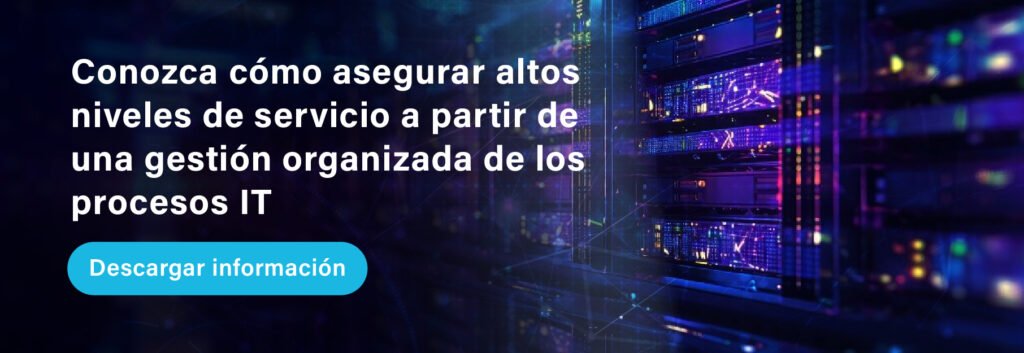Data Centers: Why are they considered the backbone of organizations?
Data center services have been experiencing significant growth in recent years, both globally and in Latin America.
An investigation of Business Research Insights revealed that the global data center services market size would reach $148.46 billion by 2028, at a CAGR of +11.91Q3Q.
For its part, Mordor Intelligence It foresees a positive evolution of the sector between 2024 and 2029, with a compound annual rate of +9.70%.
Meanwhile, a publication of Data Center Market references a report from Research and Markets, which highlights the development that the data center market is experiencing in Latin America, with a compound annual growth rate of 7,131 TP3T until 2027.
With the size of the sector in mind, let's take a closer look at its impact on Latin American companies.
What are data centers?
Data centers are considered the backbone of organizations. They are responsible for Support and execute critical processes that guarantee business continuity and operability of each company.
These are physical facilities that house servers, data storage systems, network equipment and other technological infrastructure components.
Its main purpose is to store, manage and process large amounts of data and computer applications, safely and reliably.
Among the services they provide are:
- server hosting,
- data storage, backup and recovery, and
- the interconnection between systems and applications.
Data centers can be operated by a company and its own infrastructure, or through a cloud infrastructure service provider.
What are the four essential pillars of a data center?
There are a number of pillars that are fundamental to the successful design, implementation and operation of a data center.
Due to their importance, they must be considered together to ensure the efficiency, reliability and security of each data center.
1) Physical infrastructure
All the physical components necessary for the operation of the data center, such as buildings or facilities, power and cooling systems, server racks, data storage systems, network equipment and physical security, among others.
It must be designed for ensure availability, reliability and security of the equipment and data housed in the data center.

2) IT Infrastructure
It comprises all hardware and software components used to manage and process data. This includes: servers, storage systems, networks, operating systems, databases and applications.
It has to be structured to provide a optimal performance, scalability, security and availability of the services and applications hosted in the data center.
3) Management and operations
These are all the processes, procedures and tools used to manage and operate the data center efficiently and effectively.
Understands the performance monitoring and management, along with change management, configurations, incidents, capacity and security, in compliance with relevant standards and regulations.
Data center management and operation are essential to ensure the availability and integrity of the services and data hosted therein.
4) Security
Refers to all measures and controls implemented for Protect assets, data and services hosted in the data center, against internal and external threats.
For example, unauthorized access, data theft, malware and cyber attacks.
Data center security includes physical measures, such as access control and surveillance systems. It also includes logical measures, such as firewalls, intrusion detection systems, data encryption, and user authentication.

Data center: a critical component of business continuity?
Data centers are essential to ensure the continuity of business operations in the event of unplanned disruptions such as system failures, human error, cyber attacks, or natural disasters.
Their availability, reliability and resilience are essential to maintaining the continuity of critical services and minimizing the impact on business operations during adverse situations.
To understand its relevance, it is first important to highlight that a data center stores data that is critical to a company's operations.
Critical information includes financial information, customer records, inventory, and legal documents. Many companies rely on them to process real-time transactions such as sales, payments, and financial transactions.
In the event of an interruption or loss of access to data or problems with its operation, a company can face serious consequences.
These include loss of income, damage to your reputation and various legal problems. As a result, The relationship with its customers, the trust that is placed in the company, and its results could be affected..
Secondly, it should be noted that a data center hosts applications and services that are critical to the operation of a company. For example, email systems, customer relationship management (CRM) and enterprise resource planning (ERP). Also web applications.
Lack of access to these services can prevent normal business operations and impact employee productivity.
Thirdly, it must be considered that data centers play an important role in risk management and information security. They provide a secure and controlled environment for storing and processing critical business data..
This aspect includes the implementation of physical and logical access controls, continuous security monitoring, detection and response to cyber threats, and compliance with information security regulations and standards.
Finally, we must remember that The data center is a key component in the disaster response strategyWhy? Because it provides redundancy and recoverability in the event of system failures, human error, natural disasters, or other catastrophic events.
Therefore, it is essential to consider the implementation of periodic backups, data replication to geographically dispersed locations and recovery plans. The objective is to allow Quickly restore services and minimize downtime.
This also includes resilience and redundancy measures, such as the implementation of uninterruptible power supplies (UPS), backup generators, cooling systems, replicated data storage and redundant network architectures, which minimize the risk of unplanned outages.

What corporate needs does a data center solve?
A data center addresses a company's data storage, processing, availability, backup and recovery needs, providing a secure and reliable environment to manage and protect the infrastructure and technological services critical to its operation.
It provides the necessary conditions to store large volumes of critical data for a company, guaranteeing its integrity, availability and security.
It also allows companies to access them when necessary and protect them against loss, damage or unauthorized access.
It hosts servers and data processing systems that enable a company to run applications, process transactions, and perform Data analysis to make informed business decisions.
It includes database management systems, application servers, web servers, data analysis systems and other software platforms, which facilitate the efficient and secure processing and manipulation of data.
Ensures that hosted services and applications are available and accessible to end users at all times, which is critical to maintaining productivity and operational efficiency.
Additionally, they provide data backup and recovery capabilities to protect against eventual loss.
What benefits do data centers bring to companies?
Among the most important advantages that data centers provide to a company, the following stand out:
- A secure and reliable environment for storing large volumes of business-critical data, ensuring its integrity, availability and confidentiality.
- Capacity of efficient and scalable data processing to run enterprise applications, process transactions, and perform data analysis quickly and reliably.
- Availability and accessibility of critical services and applications for the operation of the company, such as email systems, CRM, ERP and web applications, ensuring operational continuity.
- Backup and recovery capabilities to protect against possible data loss due to multiple factors, ensuring the integrity and availability of the information.
- Reduction of costs associated with management and maintenance of IT infrastructure. For example, the purchase and maintenance of servers, storage systems and network equipment. In addition to the costs associated with power consumption and cooling.
- Scalability and flexibility for the company's IT infrastructure, allowing resources to be adjusted according to the changing needs of the business, and to quickly adapt to new demands and opportunities.
- Protection of sensitive data, and Compliance with information security regulations and standards, helping to maintain customer trust and comply with current legal requirements.
Our team of Data Center Services It even provides a 35% reduction in processing times for critical milestones in the Batch chain.
In addition, he has extensive experience helping organizations optimize work times, ensure data availability and provide business predictability.

Latin America: Main challenges to improve and expand the infrastructure of its data centers
According to a market report developed by DataCenterDynamics and Huawei, the main challenges when building data centers in the region are:
- the shortage of energy capacity (13,58%),
- the financial crisis (12,96%),
- the delay of materials (11,73%),
- government permits (10,49%) and
- the ability to make resources more efficient (10,19%).
The impact of the lack of energy capacity is also reflected in the Global Data Center Trends 2023 from CBRE.
The report highlights that the global shortage of available energy is inhibiting the growth of the global data center marketThe challenge is to obtain sufficient power, especially for data center operators in North America, Europe, Latin America and the Asia-Pacific region.
Precisely, environmental concerns and the need for energy-efficient operations are Driving interest in sustainability.
In fact, the report Business Research Insights expresses that a trend in the global data center services market is the increasing integration of renewable energy sources.
Such is the interest in achieving greater energy efficiency that a report by Schneider Electric and Forrester Consulting revealed that Data center vendors' 75% misses investment opportunities due to lack of sustainability.
In addition, the 83% recognizes the use of ESG (environment, social, governance) aspects as a way to attract new business opportunities. However, Only 33% confirms that their organizations created a strategic plan of this nature.
Undoubtedly, the problems associated with achieving a constant and reliable electricity supply, together with high energy costs, are significant obstacles to the expansion of data centers in the region.
In relation to the problems linked to the financial crisis, the lack of adequate investment and financing for the construction, expansion and modernization of data centers stands out.
Government regulations and policies can also be a challenge in some countries.
Mainly when there is a lack of clarity and consistency in regulations related to data security, environmental protection, privacy and other aspects.
Another challenge may arise from a lack of technical capabilities and specialized talent in areas such as infrastructure engineering, data center management, cybersecurity and project management.
In this sense, Training in critical skills is essential to boost innovation and competitiveness in the sector.
For its part, Business Research Insights focuses on the challenges posed by digital transformation, which is emerging as a powerful driving force in the growth of the global data center services market.
Finally, taking into account that The availability and quality of connectivity, along with communications networks, are central to the operation of data centers., it is easy to see that the absence of a reliable, high-speed network infrastructure can limit operational capacity.
Conclusion
The growth of data centers in Latin America is being driven by the Increase in demand for digital services and new requirements for data storage and processing needs.
Also due to issues related to compliance with security and privacy regulations and the need for better telecommunications infrastructure and the search for business resilience.
Learn more about the Data Center services we provide at IT Patagonia.

